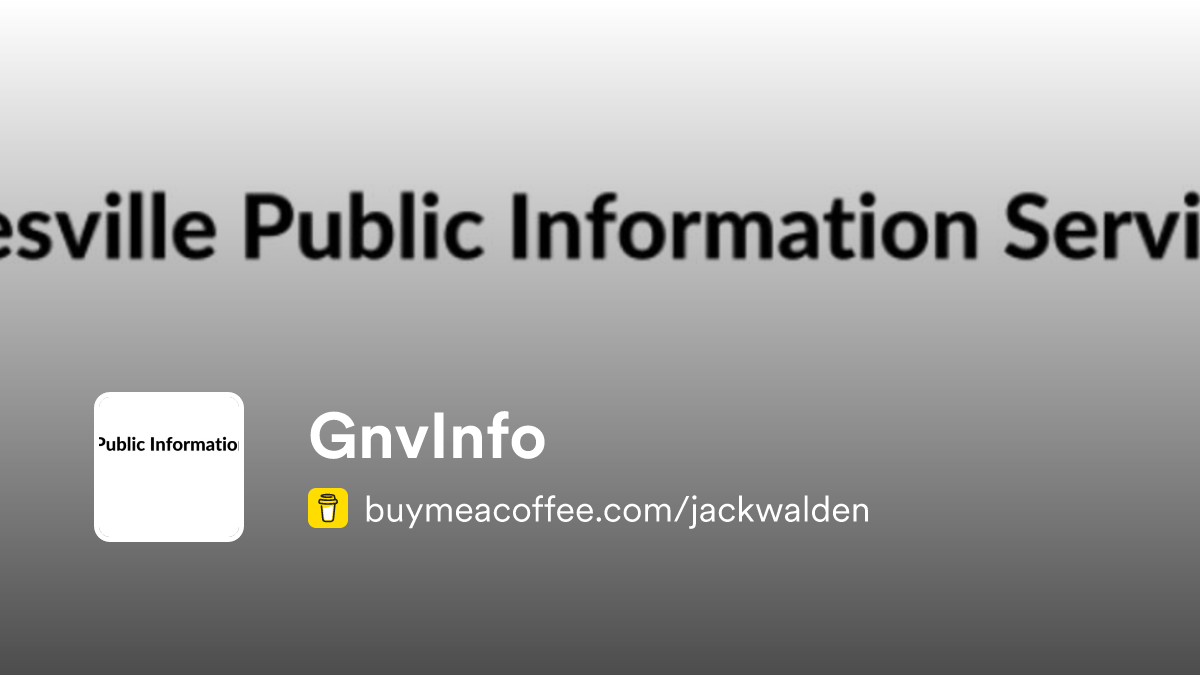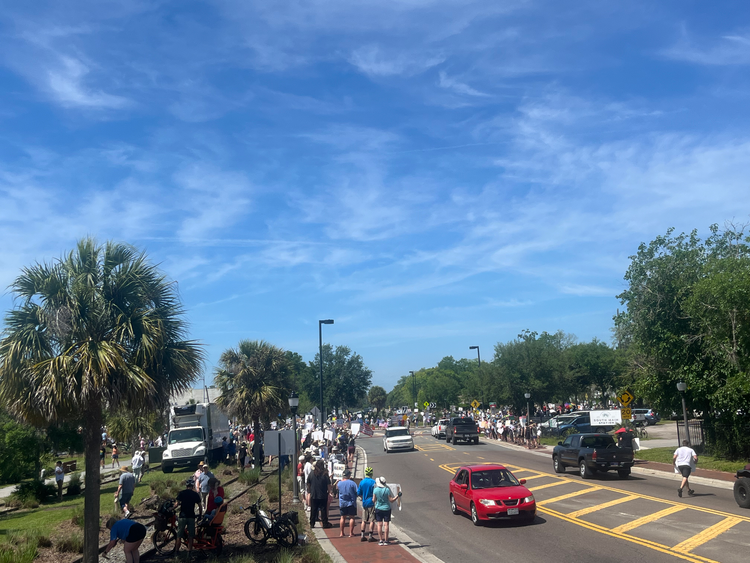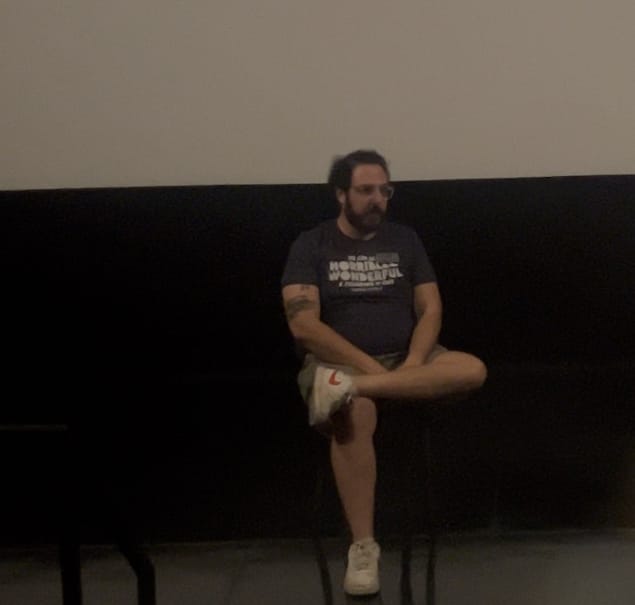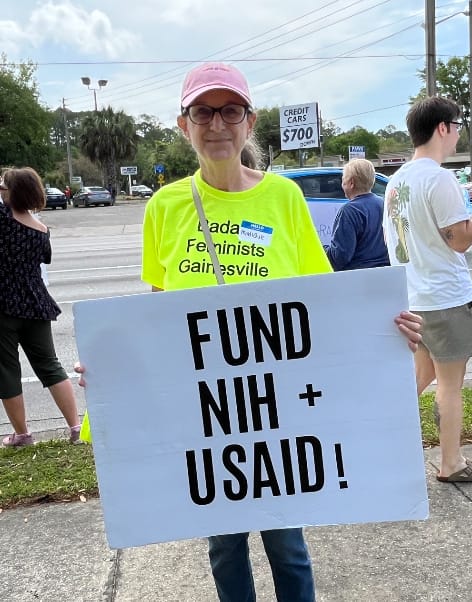County Communications Director Interviews Big Culture and Arts Festival Manager on Alachua County Talks
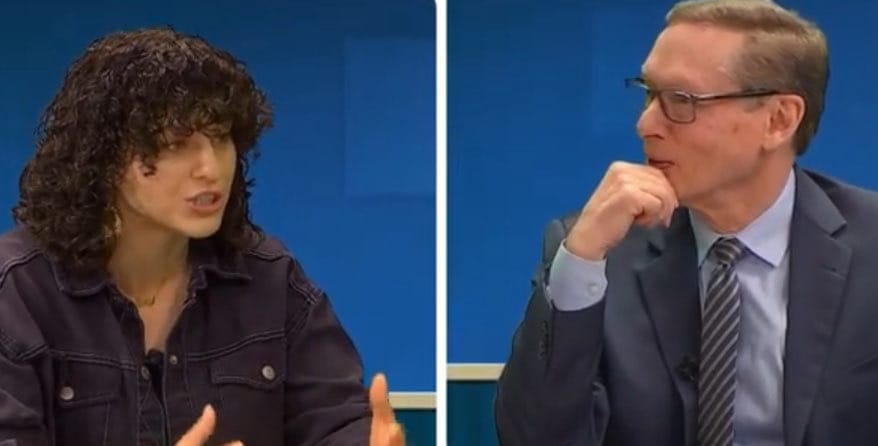
On Wednesday the county’s talk show, Alachua County Talks, published an interview between County Communications Director Mark Sexton and Big Culture and Arts Festival manager Laila Fakhoury.
Fakhoury is a community activist, co-owner of How Bazar and a title manager of Dion Dia Records.
Sexton stated in the interview “The county is very supportive of community events through our Visit Gainesville Alachua County tourism sponsorship grants. This year, we are providing additional support through Discover 200 marketing support. We are very proud to once again sponsor the upcoming Big Culture and Arts Festival.”
Sexton went on to say that their sponsorship is paid through a bed-tax by visitors, meaning it won't cost local taxpayers any money.
Sexton told Fakhoury “The music lineup is incredible.”
Fakhoury responded “We had some really great people on our team this year who helped with booking and have way more experience than us, so they were able to open some doors which was really an honor.”
Fakhoury said “BIG is meant to be a project in Gainesville that people can work on year-round to sustain themselves. It’s something that boosts our city and county, and we’re working to turn it into something that keeps people in Gainesville.”
The interview was transcribed by GnvInfo and can be read below or watched on the Alachua County YouTube channel.
Sexton: Alachua County is in the midst of its year-long Discover 200 Bicentennial celebration. We're celebrating the past, the present, and the future. The county is very supportive of community events through our Visit Gainesville, Alachua County tourism sponsorship grants. This year, we are providing additional support through Discover 200 marketing support. We are very proud to once again sponsor the upcoming Big Culture and Arts Festival.
Laila Fakhoury is an event producer, creative curator, activist, and community organizer based in Gainesville, Florida. She is dedicated to creating platforms that empower artists and creatives, notably through the Big Culture and Arts Festival and How Bazar's Artisan Night Market series. These events have provided opportunities for over 2,000 creators and contributed to the establishment of five new brick-and-mortar businesses in Alachua County.
Laila is a co-owner of How Bazar, a worker-owned apparel store, nightlife venue, and creative hub—as well as Dion Dia Records, an independent record label in Gainesville and Miami. Her Big Culture and Arts Festival, now in its third year, has brought nationally recognized artists to Gainesville while highlighting Florida’s vibrant arts and culture scene. A dedicated community advocate, she has volunteered with numerous North Central Florida nonprofits. She was an intervention counselor at the Alachua County Crisis Center and is a TEDx speaker and coach.
In her free time, Laila enjoys hosting community dinners, discovering new music, and exploring Gainesville by bike. Welcome, Laila!
Fakhoury: Thank you so much. Thank you for having me.
Sexton: What a great town we have to explore by bike.
Fakhoury: Oh, it’s the best. It’s the best way to get around Gainesville.
Sexton: We are so excited to be back with you this year for the Big Culture and Arts Festival. Why don't we kind of start by just talking about who produces this? I know you're heavily involved, but who does this?
Fakhoury: BIG is produced by several brands. How Bazar, which is our worker-owned creative space in downtown Gainesville; Dion Dia, which is our independent record label that we started out of college. It’s something that we host with a lot of different community organizations as well, so there’s a ton of collaborators, a ton of partners—and it’s really something that we say is community-lifted.
Sexton: You say "out of college"—did you go to UF?
Fakhoury: I did, yes. I was the first class of COVID—2020—when I graduated.
Sexton: Is that on your diploma?
Fakhoury: I didn’t even get my diploma, unfortunately.
Sexton: We’ll see if we can track that down for you.
Fakhoury: Yeah, right? That would be helpful. But yes, I did go to the University of Florida. That’s where I met my two friends that I started these creative businesses with. I studied social work at UF, which UF calls Family, Youth, and Community Sciences—and philosophy.
Sexton: And that’s kind of what took you to the Crisis Center?
Fakhoury: Yeah…. On my first day at UF, one of my professors in a Human Development class put a flyer on the board—they were looking for volunteers for the Alachua County Crisis Center. I was like, “That looks interesting to me.” I was very involved in social work at the time, even while in high school, so I applied. They were like, “Hey, we don’t usually take people under 25 years old,” but as an 18-year-old, I already had a lot of experience, so they let me in. That’s something I grew within and something that I feel like is very formative to what I do now.
Sexton: So you know Crisis Center Director Ali Martinez?
Fakhoury: Yes! I love Ali. She’s amazing. Shout out Ali.
Sexton: Tell me a little bit more about How Bazar. It’s a worker-owned, multi-faceted business. What are the details of that?
Fakhoury: It’s a little hard to label sometimes. Even the people who are closest to us don’t necessarily know how to explain How Bazar—and that was kind of the point. We wanted it to just be this creative cultural hub that people could use as a community space, somewhere to grow their businesses, somewhere to just express themselves. It’s really become that in a lot of ways. It’s worker-owned, which means that everyone that works it owns it, and everyone that owns it works it. There’s five of us that co-own it together. A lot of people are always surprised by that—they’re like, “I can’t even work with one person, how do you do that?” But thankfully, we’re all really connected by the ethos and values of How Bazar, and we all have different skill sets. We move in different directions and collaborate when we can to make things easier on each other. But just having all those different skill sets in one place has really made it blossom.
Sexton: Is there a retail aspect of How Bazar?
Fakhoury: Yeah, How Bazar actually started as retail. We were in the Seagle Building originally just on a month by month contract trying to get into the current space we’re in Downtown, which was a huge endeavor, a big fight to try and get in there but thankfully we got into this space so we could hold it down as a creative and cultural hub downtown. But yes, we did start with retail and we started by selling vintage clothing as a way to just build some money so we could work with local creators and local screen printers and embroiderers so that they could collaborate on making our clothes and we could pay them over a living wage for the collaborations.
Sexton: That is still flourishing?
Fakhoury: Yes, so we still do clothes. We have so much going on in the space now that it really is just one of the aspects of How Bazar. We have coffee in there now, we have a bar in there, we do a lot of night markets, block parties, dance parties. We let the space be used for others in the community to experiment with their own events in an accessible way. There’s a lot of activity there, but the clothes are in there daily.
Sexton: Back to the BIG Culture and Arts Festival. I just want to know how this evolved. What is it about this festival? What separates it from other festivals? I've been doing some research on you and the festival, and there are so many fascinating pieces to this. So can you kind of build that for us and tell us about BIG?
Fakhoury: Absolutely. To give you a full picture of BIG, I have to go back to 2018, when I met my two friends, Jahi and Khary, who are actually brothers. We met in an astronomy class, Jahi and I specifically. We connected over the fact that we both wanted to do social work and we had social work backgrounds because of our families and because of our culture and heritage. But we didn’t necessarily want to be conventional social workers or caseworkers. We wanted to find a way to express our creativity and work with the community more hands-on. So what we did is we decided to start a record label together. We started Dion Dia, which like I mentioned before, is an independent record label primarily focused on hip-hop and R&B, but not pigeonholed in any way. When we started the label we used it as a platform for social good and social change. We started doing recording programs in the hospital, primarily with patients who were living with terminal illness—so they were in end-of-life care, receiving palliative support. It was a way for us to preserve legacy and push their messages out of the hospital. We did the same thing in prisons, working with people who were primarily incarcerated with life sentences, recording their music and pushing it out into the community. It was a way for us to bring people back into their communities.
We started doing those recording programs and events around town. We got silent disco headphones—someone who’s now one of our co-owners of How Bazar, named Jose, he was actually the first person to invest in us as just 18-year-old kids. He got us our first 150 pairs of silent disco headphones.
Sexton: For those that don't know, that’s where people are listening to, not necessarily the same music, right?
Fakhoury: Exactly. I love silent discos because to me they’re the most autonomous events in the world. You put your headphones on and you get to listen to whatever you want—there are multiple DJs playing. You choose the volume, and you can take your headphones off and actually have dialogue with people, which is something that conventional nightlife doesn’t really allow for. It just creates a way more inclusive, diverse space.
We started to see that when we did events, we were very [do it yourself (DIY)]. We were just in the Civic Media Center or the bottom of the Hippodrome, or the Thomas Center—really wherever would take us. The first one had about 100 people, the second one had 200, the third had 500. We were like, okay—the community wants this and needs this.
Sexton: I have not been to one. I’m going to go to one though. I imagine that the visual is delightful and funny.
Fakhoury: It is funny. Especially when we have a station that’s playing straight-up hits that everyone knows the words to. People are just screaming their lungs out and squeaking around—it’s beautiful.
Sexton: First of all, I find it fascinating that you’re studying social work, looking for a new way to do it, and you start a record company. What a great story. How did that evolve, how did BIG come out of that?
Fakhoury: Basically when we started doing these events, we just saw so much community build around them. So many people who didn’t necessarily feel like they had space in Gainesville, or like they could express themselves. At the time, Gainesville was dominated by very specific and limited genres. It was just an opportunity to bring more people together so they could feel free to connect and express themselves.
We really loved seeing how we were building that with these events and experiences. And at that time we decided we needed to start a festival—a large-scale platform, the epitome of that kind of event that really brings people together and expresses all the different things we love.
The reason we chose a record label is because a label is just this living entity that can constantly change and intersect with all different forms of culture. My partners and I all love street culture—the automotive scene, the skate scene, fashion, music, art. A record label really combines all of that. We decided a long time ago that the ultimate vision for the label was to create this festival, and to let it intersect all these cultures so that people had different ways to be involved.
Sexton: And right when you decided to do a festival—COVID hit? Was that time timing?
Fakhoury: Not necessarily. It wasn’t exactly then. We had the vision for the festival from the beginning. We just knew it was going to take time, and we’re all about timing and patience. We didn’t want to rush anything until we were ready to do it. We kept doing our events and became more intentional with them. The last event we had before COVID was actually the most perfect event we had ever had. We looked around and were like—this is exactly what we envisioned. All different types of people, everyone getting along, supporting local art—whether visual art in a gallery or music by hip-hop and R&B artists. We were like, ‘this is it, we made it’ and then COVID happened.
Sexton: Was that BIG at the time?
Fakhoury: No, that was just one of the events we were doing through Dion Dia. BIG actually started after COVID.
Sexton: Was it kind of an extension of what you had done pre-COVID?
Fakhoury: Definitely. Before BIG even happened, during COVID, we started How Bazar. We got into our physical space in the Seagle Building on that month-to-month contract. We started doing outdoor night markets so that our friends who were artists could continue to sustain themselves through their creativity in a safe way—because we were outside, socially distanced, masks required. We were able to connect with the community again and saw that people really were craving those connections and wanted to sustain themselves through their passion and creativity.
We started How Bazar, and from there it grew way quicker than we expected. I think it’s because we had that time during COVID to really think through what we had done with Dion Dia and how we wanted to offer it to the community in a more innovative, effective, valuable way. From there, we started BIG.
Sexton: I'm wishing I had a two-hour program because this is fascinating. But I want to make sure we get to this year’s BIG—the lineup is unbelievable. The different entities or pieces of BIG—the film festival, the circus stuff—tell me what the pieces are this year?
Fakhoury: There's a lot. I should have brought my map with me, but to give you kind of an idea—the theme of the festival is Where Circus Meets Street Culture.
The reason we chose the circus theme is because we’re really inspired by the original concept of the circus—before it started exploiting humans and animals. The idea was that no matter who you were or where you lived, if you felt alone in your community, you knew the circus was going to come into your town once a year and celebrate you for your true and authentic self.
That’s what we wanted to bring to Gainesville—a space where people can really just be themselves and feel comfortable doing that, so they can connect over it…. Street culture [comes in] because, like I mentioned, we love different forms of culture—automotive, skate, film, everything. We wanted to include all of that in the event because it really makes it way more diverse. People might come for the film festival and then be exposed to music they didn’t know they liked. Or they come for the music and then see the cars or the skate scene and get into the automotive or skate scene. So there’s basically an entry point for anyone to be involved.
Sexton: The music, just to focus on each section, the music lineup is incredible.
Fakhoury: Thank you so much! Yeah, that was definitely the result of a lot of hard work, and years of experience just talking to people and figuring out how to book artists—how to go about it professionally, or through friends and family. We had some really great people on our team this year who helped with booking and have way more experience than us, so they were able to open some doors which was really an honor.
Sexton: I got a little taste of that with the Discover 200 event that we did at Depot Park and at Heartwood. It's an incredibly complex thing. But what I really love is, you seem to have a really good mix of national and international acts—and local. You’re celebrating both.
Fakhoury: Absolutely. I mean, this festival is Gainesville-rooted. We’ve been told multiple times, “Oh, take it to Miami, take it to Orlando, go to New York, go to California,” because of the concept.
Sexton: Ignore all those people.
Fakhoury: Oh, don’t worry—I don’t listen to them. That’s why we’re here on Alachua Talks. But really, it is Gainesville-rooted because we have so much belief in and support in Gainesville’s creative community. This space, something about Gainesville is just so supportive and uplifting for creatives. It brings people into the community who are so unique and expressive—and those are the people we want to continue to uplift.
There just aren’t enough people really understanding that Florida people—Florida natives, Gainesville people—they need this kind of inspiration and creativity coming into the state, so we can continue to grow. We deserve to have these artists’ names on the same lineup as national and international touring acts.
Sexton: When is the festival?
Fakhoury: The festival is Friday, April 11th, and Saturday, April 12th.
Friday is going to be our block party in front of How Bazar. We’re closing the street on Southwest 2nd Street and using How Bazar, Café Voltaire, and Lucy’s as venues for bands, DJs, an open mic, and a cipher. In the street, we’ll have cars, a skate competition, a fashion aspect, food vendors, artisan vendors.
Then Saturday, April 12th, is the main day of the festival. That’s happening just down the street, between the Porters Quarters neighborhood and South Main Street. That’s where we’ll have all of the eclectic experiences and the big headlining artists.
Sexton: How does the neighborhood feel about the event?
Fakhoury: We’ve been doing a lot of outreach with the neighborhood. We’re pretty close with a lot of people who are considered community leaders. We’ve attended their monthly meetings, and we’re doing walks around the neighborhood with some of the residents—who have graciously allowed us to come with them—so we can hand out flyers and free tickets to people who live there.
We know it’s a loud and intrusive experience, so we try to be as respectful as possible and reach as many people directly as possible. We did that last year, too, and this year we’ve just built on that. Thankfully, more people are aware of it now, they understand it, and we try to find as many ways to be as cognizant and respectful as possible.
Sexton: How do you attend? Do you sell tickets online?
Fakhoury: Yeah, we sell tickets online. We’re actually going through them pretty quickly, thankfully, so we want to make sure that people get their tickets as soon as possible. One ticket is good for both days—Friday and Saturday. The website is bigcaf.com, where you can get your tickets now.
Sexton: I was very impressed to see the amount of sponsorship you had. I know that Visit Gainesville Alachua County—through bed tax paid by visitors—not by local taxpayers—funds the event, and we’re helping out this year too. But you’ve got West Law Firm, IQ Fiber, Real Ones, Pulp Arts, Jolt Radio—it’s impressive. You have a number of donors too. So you're obviously putting together a grassroots, from-the-ground-up, community-supported event.
Fakhoury: Yeah. One of the things we did this year is we went to a lot of different individuals in the community—you can see them listed on our website—who donated to the event. We created this art installation called “The Giving Tree.” One of the really beautiful live oak trees right in the middle of the festival grounds—that's what we’re calling The Giving Tree. We reached out to individuals to donate something small to the festival, and now we’re hand-engraving wooden plaques with their names and hanging them from the tree. We're using the tree as a symbol that small amounts of community support can create something Big. You might not expect something like this to be possible in Gainesville, but we’re trying to show people that it really is—with lots of small support combined together.
Sexton: I am so inspired by your obvious enthusiasm for this event. I want to make sure we get out the nuts and bolts though. There will be food vendors and other kinds of vendors there?
Fakhoury: Amazing food vendors. Friday night is going to feature a market with 26 artisan vendors who were all hand-selected. They do different things like art, records, plants, clothes, things like that. There’s going to be skateboarding, a drive-in theater installation for the film festival. We're still collecting some films—we gave people time to film and come up with their concepts. The theme is “What’s Big to you?” People have been submitting slowly but surely.
Sexton: Are these all local filmmakers?
Fakhoury: No, some are coming from other places—we’re getting films from Atlanta, from Texas, from California. There's a lot of diversity.
Sexton: Will I be able to sit in a car?
Fakhoury: Absolutely. You can sit in one of our classic cars. Some people from the community donated their cars for us to sit in and we have a radio transmitter so you can jump in and listen to the films.
Sexton: I know the venue itself—part of it is in grassy and dirt areas, so you probably want to wear sensible clothing and shoes?
Fakhoury: Of course. That’s something we’ve been pushing in our marketing too—dress comfy, dress cute, but dress comfy.
Sexton: Cute is required?
Fakhoury: Not required—you can dress however you want. I just think everyone is cute.
Sexton: I feel like we’ve got the nuts and bolts of it out. Do you work with local circus performers?
Fakhoury: Yes, very heavily involved. We have some friends—Griffin Wolf and Jill Dumas—who have both been our circus coordinators this year. They’ve brought in community circus performers who do aerial, fire, contortion, different things like that…. We’ll have an aerial rig, a circus house with a few cabaret shows and circus vendors.
Okay, I’m going to tell you this on TV... There's going to be a surprise circus parade that happens during the event.
Sexton: Your secret is safe with me.
Fakhoury: Thank you. But we do want everyone to be there for it—so make sure you’re there at 7:50 p.m. for a special surprise on Saturday, April 12th
Sexton: Saturday, April 12th. What was that time again?
Fakhoury: 7:50 p.m.
Sexton: For the surprise?
Fakhoury: Yes.
Sexton: It’ll be worth it?
Fakhoury: It’ll be so worth it.
There’s a lot wrapped up into it. It’s not just a circus parade, they’re gonna have a circus performance on stage.
Sexton: Tell me a little more about Dion Dia? Your website says Gainesville and Miami—what's the Miami connection?
Fakhoury: Basically, when I met Jahi—one of my business partners. When we met in college he actually left school to take a job in Miami to support his family and community. While he was there, he spent that entire time trying to connect with as many people as possible in Miami for venues and artistry just to make different connections and spread the word of the label there. He’s really our connection and feet on the ground in Miami. We did our first event there this past August and it was more amazing, more amazing than I could’ve expected. We’re planning on doing more because the Miami community has been incredibly supportive and loving. A lot of them have been coming to our festival, block parties, and night markets too. We’re trying to solidify that Miami-to-Gainesville pipeline that already exists but less for the universities and the college but more so for the artistry and community connection.
Sexton: I noticed on the website that you have hotel information. I know anecdotally from talking to folks downtown that this is a major economic boost for downtown and the community in general. Can you tell us a little bit about what you’ve learned about the economic impact of BIG?
Fakhoury: BIG is meant to be a project in Gainesville that people can work on year-round to sustain themselves. It’s something that boosts our city and county, and we’re working to turn it into something that keeps people in Gainesville. One thing we’ve learned as creatives here is that its very easy to be a creative in Gainesville because our community is supportive and forgiving, and there’s a lot of space to experiment. But it's very hard to support yourself as a creative here due to limited job opportunities. That’s why we want this to become something that people can work on year round and feel like they can sustain themselves so they can stay in Gainesville and continue to build the art and culture community here in the city and the county too. We want it to be a space where Gainesville is allowing more people to come into Florida as touring artists and visual artists so it really just continues to build Florida’s art and music scene.
Last year, we had a one-day festival and our friend Jessica from the county ran the numbers of the festival through her economic impact calculator and found that in one day we had over $325,000 worth of economic impact in the county alone. To us thats amazing because it was just one day and less was put into it intentionally to make those types of impacts.
We have amazing hotel sponsors. We have a hotel block with Best Western and Towneplace Suites. We’re seeing so many people who are going to be coming into the county this year. Last year we had about 20% of our ticket holders from out of county. This year we’re imagining that it will pass 35%. We’re already seeing that because we’re seeing people buying tickets from Chicago, California, New York, and a ton from Tampa and the St. Pete. area. We’re trying to build it into something that's sustainable for creatives.
